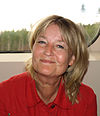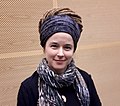| Minister for Culture of Sweden | |
|---|---|
| Statsråd och chef för Kulturdepartementet | |
 | |
| Member of | The Government |
| Appointer | The Prime Minister |
| Term length | No fixed term, serves at the pleasure of the Prime Minister |
| Inaugural holder | Bengt Göransson |
| Formation | 8 October 1982 |
| Website | Official website |
The Minister for Culture (formally cabinet minister and head of the Ministry for Culture ) is a member and minister of the Swedish Government and appointed by the Prime Minister. The minister heads the Ministry for Culture and is responsible for cultural issues and construction.
Contents
Before 1 December 1991, the cultural issues were handled by the Ministry of Education. Between 1991 and 2004, and from 2006 it's a separate ministry. In the years between 2004 and 2006, the issues were handled by the Ministry of Education and Culture.
The current Minister for Culture is Parisa Liljestrand, who was appointed on 18 October 2022.












